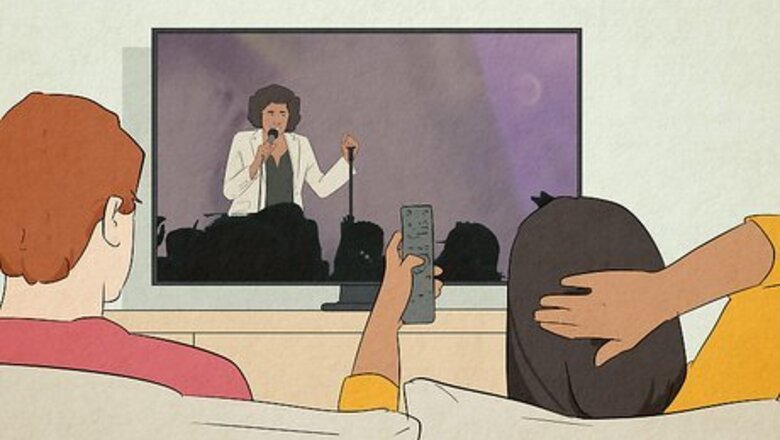
views
- Draw on your experiences with the person or their quirky habits to generate joke material (“Until I met John, I’d never seen someone eat a hot dog longways.”).
- Craft a misleading setup paired with a funny, unexpected punchline about the person (“Susan is the best friend, confidant, and shoplifter I’ve ever met.”).
- Make sure ahead of time that the roastee is a good sport who can take a joke. To be safe, try to avoid touchy topics like past relationships, religion, or death.
Gathering Joke Ideas
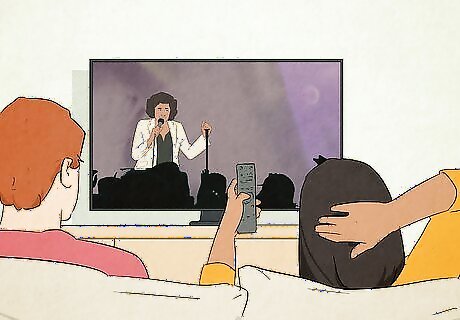
Watch other roasts for inspiration. If you don't have much experience with roasts, take some time to do research. Watch roasts of other people and figure out the techniques people use make people laugh (including the roastee!). You can find roasts of celebrities on comedy channels or online. Watch professional roasts on TV with a grain of salt. Pro comedians go harsh and dirty for shock or entertainment value, but this isn’t always great for a friendly roast. For example, if you're roasting your boss at a work event, extra foul language, sex jokes, or stories about rule-breaking would concern them rather than make them laugh.

Think about the roastee’s odd habits or quirks. Write down anything the person does that's a bit crazy or silly. Maybe the person has a habit of only eating food on separate plates, or only getting in the elevator if there are fewer than five people on it. These little habits can be great for filling out a roast. For example, if the person loves peanut butter and bologna sandwiches, that's outside the norm and people may find it funny (“The only thing worse than Carl’s taste in style is his taste for peanut butter and bologna sandwiches.”). Try not to pick at character flaws or harmful behaviors that are more concerning than funny. These can be uncomfortable for the roastee and audience. For example, say the person frequently sends mean messages to people. It’s certainly odd, but it’s emotionally hurtful and hard to make lighthearted.

Recall notable memories you have of the person. Brainstorm a list of interesting or quirky interactions you've had with the person. Everyone has days where they're a little off, and how that person acted on an "off" day could be a source for a roast. Alternatively, if you have any memories where the person did something truly goofy, that could make a great funny story for a roast. For instance, maybe a person jumped into the pool fully clothed at an office party to save a box of donuts. You could use that to tease the person a bit (“Deandra loves sugar so much that she once ruined a $1,000 Armani jacket to rescue a $5 box of donuts from the pool.”).

Stretch the truth, but don't ignore it. Think of a good roast joke like a caricature drawing—the subject’s features are exaggerated for comedic effect, but aren’t completely made up. Often, the roast jokes that get the most laughs have an element of truth in them, but don't cross the line into being outright mean. For instance, you might mention a pair of pants that Joe wears to work that are just a bit too short, then riff on his Steve Urkel-esque fashion sense. This way, you’re not attacking the person's style without context or just berating them for wearing ill-fitting clothes.

Scope out information from others who know the person. If you're having trouble coming up with enough material on your own, ask other people if they have anything they'd like to add. You may find they contribute something you never thought of, making the roast that much richer. Try using stories from your social group over the years. For instance, maybe the person always burns dinner when guests come over, and so it's a joke in your group: "Everyone knows Joe’s misadventures around the grill. So when he invites me over for a cookout, I skip a step and bring the fire department with me. OK, honestly I just make up an excuse and get take-out instead. There’s really no punchline here. Joe’s just a terrible, terrible cook.”
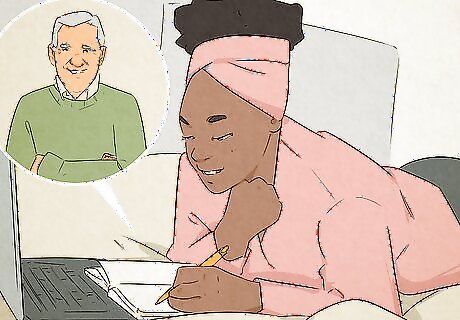
State obvious traits about the person. Focus first on things that everyone who even barely knows the person being roasted will quickly recognize. Is the person really tall? Do they have a shockingly deep voice? Are they bald? As long as it’s something you know they can laugh about, aim several of your jokes at this kind of easy target. You don’t have to drive yourself crazy looking for obscure joke topics. Is the person getting old? Try something like “Larry didn’t need to go to the theater to see The Mummy. He was there when they wrapped and buried it.” Is the person bad with technology? Try “Larry is a decent nurse, but terrible with computers. He’s introduced more viruses into the office than the patients have.” Is the person overly frugal? Say “Larry’s so cheap, the shops in town had to change the notes by their cash registers to read ‘Take a penny, LEAVE A PENNY, LARRY!’”
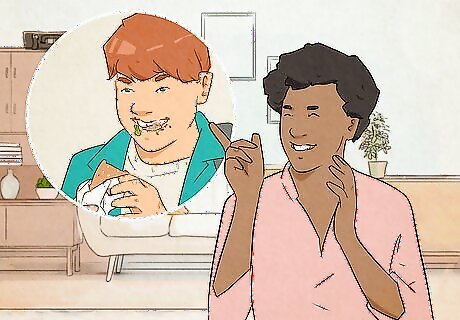
Stick to specific traits and not their race, gender, or sexual orientation. In comedy, making a marginalized person’s identity the punchline is called “punching down” and is more likely to get groans than laughs. Show that you can roast the individual by skewering what they say and do rather than relying on stereotypes and things they can’t control about themselves, like their skin color or gender identity. Denigrating humor can accidentally deepen people’s subconscious prejudices instead of bringing people together with laughs. If you do share an identity layer with them, you might get away with friendly jokes if it’s obvious in the setup that you have that in common and you're both comfortable talking about it.
Crafting & Delivering Jokes

Brainstorm multiple punchline options on note cards. Put your story or joke setup on one side of the card. On the other side, come up with punchlines, including different directions you could take the joke (like less insulting, more insulting, sentimental, or absurd). That way, it makes it easier for you to adjust your jokes based on audience response. For instance: Setup: "Just look at him over there, slouched in that chair. Let me tell you, my brother is so lazy …” Punchline 1: “... he can’t even summon the energy to laugh at these hilarious jokes.” Punchline 2: “... that when his ex-wife said ‘That’s it — I’m leaving,’ he said ‘Could you grab me a beer on your way out?’” Punchline 3: “... that no one even bothers to ask him to do anything anymore — oh, wait — I just realized — my brother is a genius!”
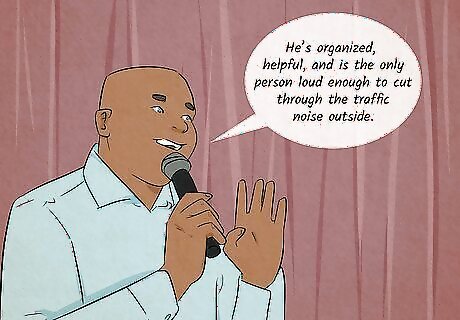
Misdirect your audience and end a joke or story with a surprise. Set up a story or joke so the audience expects a normal outcome. Maybe you’re listing the person’s positive qualities (“Dash is a great coworker. He’s organized, helpful, and punctual.”). Instead of ending with a positive quality like the audience expects, swap in a punchline about the person’s quirks instead (“He’s organized, helpful, and is the only person loud enough to cut through the traffic noise outside.”). For another example, say the person has an obsession with tea. You could tell a little story with a surprise ending this way: “One time, I saw Jane lugging a box of like 200 tea bags into the office. I said, ‘Jane, how can any person drink that much tea?’ She said ‘I’ll tell you a secret — I soak my feet in it under my desk to help with foot odor.’ And when I asked ‘Then why are your teeth stained brown?’ she answered ‘Well, this tea is expensive. I’m not going to waste it!’"
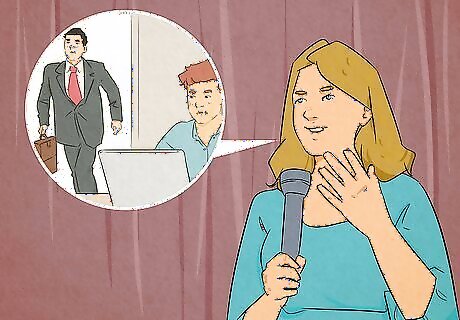
Include details about the person in your setup to heighten your jokes. Put what you have to say in perspective by using stories to drive the point home. If you just say, "Haha, isn't Fred a joke? He's always running late," that's not very funny. However, if you put the same point in a story, people will find it more amusing. Just make sure to get to the point quickly and without an extensive exposition. For example, you could say, “Fred has never been on time for a staff meeting. In fact, when it came time for him to lead one, he thought he was supposed to start it with ‘OK, any questions before we finish?’ And for the ‘continental breakfast’ he brought lukewarm decaf and half an onion bagel for everyone to share.”

Pace yourself and leave pauses for laughs. Good timing is crucial for comedy—if you rush through a story or the punchline, you might leave people in the dust because they miss details or can’t understand you. Instead, speak at a conversational pace and include pauses so that your audience can keep up (especially while you're delivering the punchline). For example: “Steve has been at this company for 14 years and has never learned how to use the copy machine. [short pause for audience comprehension] His paperwork is like that one time he won employee of the month—[pause to set up the punchline]—not replicable.”

Tell your jokes with confidence to pull them off. Believe in your jokes—or at least act like you’re confident in them—for people to actually come along for the ride. If you’re not sure if a joke will land, say it with a little extra bravado or energy to really sell it. Even if it doesn’t get major laughs, the audience will feel at ease because you seem at ease. If you're not confident in your jokes, the people around you won't be either. To seem confident, look around the room and make eye contact with people. Speak in a clear, engaging, conversational tone. Stand up straight and try not to fidget. Practice your set in the mirror a few times to check your demeanor. Remember, you’re putting on an act!
Keeping It Funny (And Not Mean)
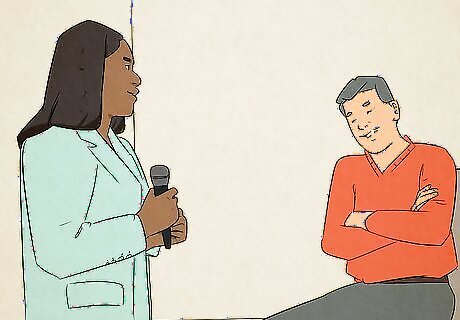
Make sure the person is a good sport. Think back—have you ever poked fun at the person? If they reacted badly, they may not be a good candidate. If you’re not sure how they’d react, ask them if they'd be comfortable with getting roasted (as long as it's not supposed to be a surprise). You don't want to roast someone who will be seriously offended by what you have to say. Roast people who can laugh at themselves. While people who can’t take a joke are often the ones most deserving of a roast, they’re also usually the worst ones to actually roast.

Steer clear of topics that would offend the roastee. Use your own experience with the person or consult people close to them to decide which categories are fair game, and which are over the line. If you cross that line, you could seriously offend the person. Remember that the line is in a different place for every person, so tailor your jokes to the individual. For instance, bringing up the eating habits of someone you know has struggled with an eating disorder or body image issues is not a good idea (unless they say they’re OK with it). On the other hand, bringing up eating habits for a different person may be perfectly fine, but they may have other sensitivities, like the way they dress.
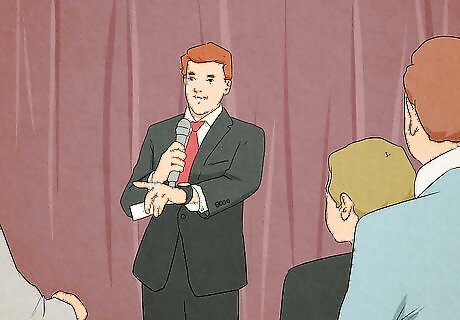
Test your more sensitive material on a small audience. If you have jokes that you think may go too far, try running them by someone in the social group first. For instance, if you're roasting a co-worker, ask another co-worker what they think. If it's a family member, ask someone else in the family. Usually, someone can tell you if you've gone too far. Pick someone who will be discreet about the material you're testing. If it does go too far, you don't want it to get back around to the person.

Go easier on the person if they seem uncomfortable or upset at your jokes. Watch the roast recipient’s body language—if they're relaxed and laughing along with everyone else, assume you're probably doing okay. However, if the person looks uncomfortable, move on to another topic or go with your softer punchlines for the rest of your set. For instance, the person might not be into the jokes if they have an upset expression or a fake smile plastered on. Other unhappy positions could be having their arms or legs crossed, leaning away from you, or getting restless and moving around in their seat a lot.
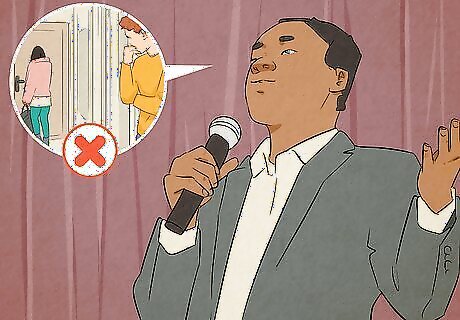
Skip jokes about past relationships. Past relationships are often a touchy subject for people, particularly if the relationship isn't that far into the past. Also, think about who the person will be with when you're roasting them. If they're in a different relationship, you could end up causing trouble without meaning to by bringing up the past. That said, some people can handle these jokes just fine. It all depends on the individual. You may have license to roast a past relationship if you were the one in the relationship with them!

Try to stay away from classic “taboo” topics like religion. If you don’t know the roast recipient super well or are performing in front of a mixed audience, stick to stories and quirks about the person and avoid offending someone with touchy subjects like politics, religion, or the death of a loved one. Jokes in these arenas can ostracize large groups of people, including the person you're roasting. If you’re on the fence about how a joke will be received, use “better safe than sorry” in deciding to leave some topics off limits. On the other hand, there’s no hard and fast rule here. Use your knowledge of your target and your audience to decide if a joke will fly.

Listen to your gut to tell teasing and being mean apart. It's hard to know exactly when a joke crosses the line into being nasty or mean, but you'll usually get a feeling. If one of the jokes you're thinking about making has you feeling uncomfortable, just skip it. Roasting is supposed to be fun, not truly mean. If you can’t enjoy yourself while telling the jokes, then why bother doing it at all?
















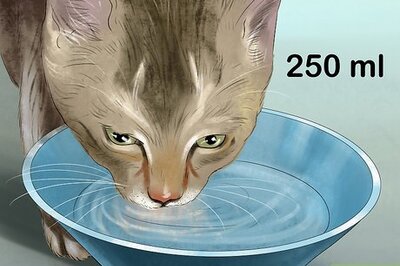



Comments
0 comment